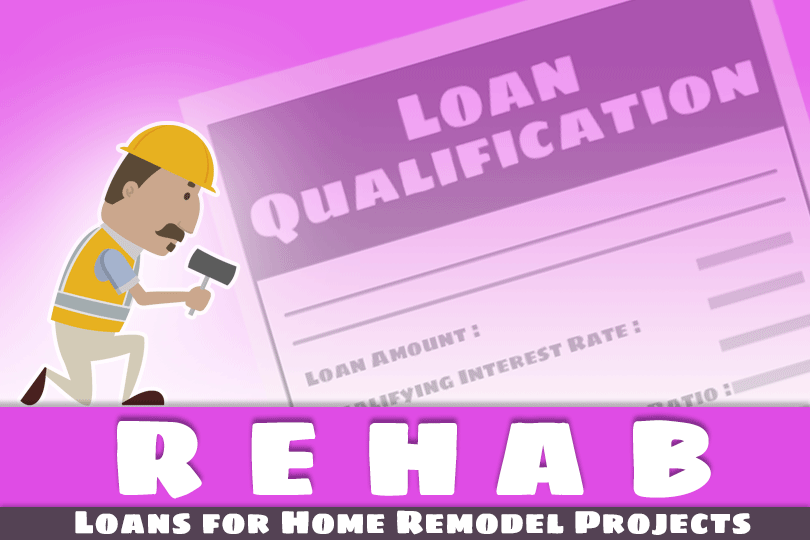What You Need to Know About the FHA Rehab Loan
October 30, 2021
WHAT IS THE FHA 203(K) LOAN?
The FHA’s Section 203(k), or Rehabilitation Loan is a government-backed mortgage that allows borrowers to refinance their home to include the costs of renovating the property.
Buying a home in need of considerable "rehabilitation" can be stressful when you’re not sure how to pay for it. Initially, it used to mean a complicated and expensive process, with high interest rates, short repayment terms and a balloon payment. The FHA Rehabilitation Loan program allows lenders to cover the purchase or refinance, as well as the rehabilitation of the home, as part of a single mortgage. This loan can be used to finance a property that is at least one year old. A part of the money goes toward paying the seller—on in the case of a refinance, it pays off the existing mortgage—with the rest placed in an escrow account, disbursed as rehabilitation goes on.
HOW TO QUALIFY FOR AN FHA REHAB LOAN
To qualify for an FHA Rehabilitation Loan, the FHA requires that the total cost of repairs amount to at least $5,000. However, FHA Loan Limits still apply, so the total value of the property must fall within the lending limits for that area. With Rehabilitation Loans, the property value is determined by whichever is less: The home’s value before rehabilitation plus the calculated cost of repairs, or110% of the appraised value of the property after repairs. Keep in mind that the FHA Rehabilitation Loan comes with all of the flexible borrower guidelines that the FHA offers on its other mortgage and refinance programs. However, there are some additional fees that lenders can charge, such as a supplemental origination fee, fees to cover the preparation of architectural documents, and a higher appraisal fee.
ARE MY REPAIRS ELIGIBLE?
FHA’s Section 203(k) insurance can cover anything from minor repairs (as long as they exceed $5000 in cost) to virtual reconstruction (a property that has been demolished as part of rehabilitation is eligible, as long as the existing foundation system is in place). According to HUD, the types of improvements that borrowers can make on their home with an FHA Rehabilitation Loan include:
- Structural alterations and reconstruction
- Modernization and improvements to the home's function
- Elimination of health and safety hazards
- Changes that improve appearance and eliminate obsolescence
- Reconditioning or replacing plumbing; installing a well and/or septic system
- Adding or replacing roofing, gutters, and downspouts
- Adding or replacing floors and/or floor treatments
- Major landscape work and site improvements
- Enhancing accessibility for a disabled person
- Making energy conservation improvements
To qualify for the limited version of the FHA Rehab Loan, the renovations need to meet some requirements:
- The renovation timeline is expected to be six months or more
- The project requires more than two payments per specialized contractor
- The required repairs in the appraisal require a consultant to develop a specification of repairs
- The repairs require plans or architectural exhibits
------------------------------
RELATED VIDEOS:
There's a Difference Between APR and Interest Rates
Choose Your Mortgage Lender Carefully
Getting Started With Your FHA Loan Application

FHA Loan Articles
April 30, 2025 In a previous post, we discussed why FHA borrowers should carefully consider whether paying for discount points truly serves their best interests, focusing on factors like short-term homeownership, opportunity cost, FHA mortgage insurance, and the prevailing interest rate environment. Discount points are an option for borrowers willing to pay a fee to lower the interest rate by a set amount. This is not right for all borrowers, and you don't want to pay for points you won't benefit from during the loan term.
April 29, 2025Are you considering buying a home with an FHA loan? You'll likely talk to your participating lender about FHA loan "discount points" – fees you pay upfront for a lower interest rate on your mortgage. The idea behind discount points is a straightforward exchange: you spend money today to reduce your interest rate. Typically, one point equals one percent of your total FHA loan. In return, your interest rate might decrease by an amount you and the lender agree upon.
April 28, 2025Home loans have various expenses that aren't apparent to a new borrower until much later in the process. What do you need to consider when making your home loan budget? It might not be complete without addressing some of the issues we cover here.
April 23, 2025 While the prospect of lower interest rates or more favorable loan terms can be enticing, there are situations where waiting is the better option. Refinancing without carefully considering your current financial circumstances is never a good idea, but careful planning in the current financial environment is even more important.
April 22, 2025First-time home buyers worry about loan approval, but there are important steps to take to increase the likelihood that the lender will approve their application for the loan or pre-approval. What do you need to know before you choose a lender?







